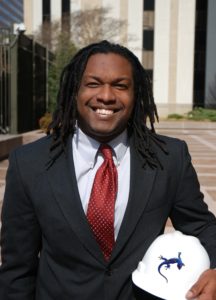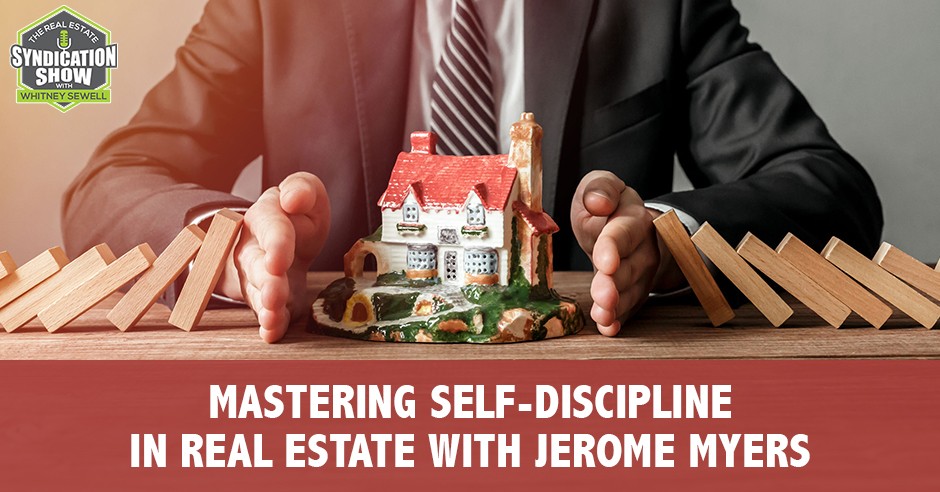Listen to the podcast here:
If there’s one skill you have to master in real estate besides building connections and the like, it should be self-discipline. It is an indispensable skill to becoming successful and winning deals. Jerome Myers, the Managing Director of The Myers Development Group LLC, recounts his transition from working at a full-time job to dedicating his time to real estate. This took a massive load of discipline to thrive, struggles to outwit, and he completely nailed it. Find out how to trust the transition and survive the journey to becoming a pro in real estate. Also, find out how Jerome mitigated the issues on due diligence with his first deal.
Our Gracious Sponsor:
Investor Management Services (IMS) is the first and leading investor management software platform for CRE owners and private equity real estate firms who manage outside investors. With 400+ customers currently managing 50,000+ investors and more than $35 billion in equity on the platform, IMS will enable you to save time and resources, drive value, and improve the investor experience. Listeners will receive a 15% discount by using the link imscre.com/podcast. The IMS Platform – Productivity for You; Transparency For Your Investors.
—
Watch the episode here:
Listen to the podcast here:
Mastering Self-Discipline In Real Estate with Jerome Myers
Our guest is Jerome Myers. Thanks for being on the show, Jerome.
Whitney, I’m so glad to be here. Thanks for having me.
Jerome is a Managing Director of The Myers Development Group, LLC also known as MDG, which was established with the mission of improving the world by developing places and people. The company has evolved over the past decade into a consultancy that offers services to individuals, small companies, and government entities and other firms. MDG is focused on supporting its partners in the areas that are critical to their success. These areas include general contracting, property development, single-family residences and apartment buildings with 20 to 50 units in Central Virginia and North Carolina. It’s also an engineering consulting business strategy and organizational development. Thanks for being on the show. I appreciate your time. Share with the audience a little more about who you are and what your focus is.
I grew up in Fayetteville, North Carolina. I’m the son of a soldier and a stay-at-home mom. Back in the eleventh grade, I found out what engineering was and I made the decision to follow that path. I went to North Carolina Agricultural and Technical State University to study civil engineering. After graduating, I went and did some stuff in Corporate America. Back in 2016, I went into real estate full-time. I had been dibbling and dabbling while I was in Corporate America doing some private money lending and learning the fix and flip business from some of my friends.
I wanted to dive in and be fully invested in the process. We got our first apartment deal in November of 2016. We’ve done three or four since then and we just put another one on a contract that’s supposed to close before the end of July. We’ve been hitting that pretty hard and heavy. In addition to that, we’ve started a podcast called the Dreamcatchers Podcast, where we highlight individuals who are pursuing their dreams and making them real. I’ve been busy and it’s been a fun ride. Getting to talk to experts like you and other people on our podcast has been my passion for the past several months or so.
You’re a son of a soldier, stay-at-home mom and you talked about your education a little bit. What made you want to pursue the entrepreneurial journey or real estate?
In my last role in Corporate America, I was in charge of building a division of a construction company. I was employee number two in that division. We went from about 175 people over the course of a few months. We took that revenue from $0 to about $20 million. I’d always been interested in being an entrepreneur before. Having an opportunity to build a business and then see how the profit and loss statement worked and see the challenges that you have to deal with without taking a pay cut gave me the confidence that I could be successful out here. I had a ton of formal training. The actual experience of running a business without somebody telling me what to do or watching over my shoulder on a consistent basis, I needed it in order to have the confidence and jump and go.
Tell me about the transition from the full-time position to entrepreneur? What did that look like for you and what gave you the confidence to make that leap?
[bctt tweet=”If you’re willing to keep putting one foot in front of the other, you’ll get there.” username=””]
It was painful if I’m completely honest. I left without a warm start. I didn’t have an engineering contractor work on a flip project that was in the process that was going to pay me some revenue. I had about a year’s worth of expenses and savings and I just started with that. Some things happened and we were able to make a little bit of money, but it was nowhere close to the high hundreds that I was making in my job. It was a culture shock. Some good things started to happen. It never happened as quickly as I hoped it would. In the end, it never ended up being as much money as I thought it would, but I kept getting those little wins that kept encouraging me to keep going and keep going.
It was interesting because I would consistently get phone calls from recruiters trying to steer me in one direction or the other. Many of them were significant steps backward from where I was in my previous role. At times, I often thought it would be a whole lot easier to go do that. When I started thinking about my children and what I would be able to do with the job versus what I would be able to do with the company I built, I’m thinking about my past success in building 30% profitable business with multiple millions over the course of a very small period. I thought that I should continue the path and see if I could do for me what I did for others.
I appreciate your transparency. If any of us said that was easy, you’re not honest. If you’re used to having that deputy position, you feel at the time that that’s security and it’s a lot to give that up. What would you tell yourself now that you’ve done it? You’ve grown in this real estate business and you’ve had those small wins, you’re building, you’re moving forward, you kept going, you didn’t give up, you didn’t take advantage of the recruiters calling. What would you tell yourself that you’re in the position you’re in now? Somebody else might be struggling in that same spot with that transition.
I would tell them it’s never going to happen as fast as you think it’s going to happen, and you have to be okay with that. You want to push, fight and drive for results, but understand that just because you want that to happen, that doesn’t mean that it’s going to happen in the time that you want it to happen. If you’re willing to keep putting one foot in front of the other, you’ll get there. It’s the tortoise and the hare thing. I pride myself on being efficient and the tortoise, every time you read the book, he wins the race every single time. The hare runs and does a dash and then he stops. He runs and does another dash and then stops. This is on that same pace. You’ve got to be steady on this thing. It’s a marathon and not a sprint. That is the hardest thing because I get a thrill off of completion. The arduous piece of doing the tasks over and over again and being in the process continuously is tough for me. I do pride myself on being a disciplined person. I’ll see it through to the end regardless of how painful that piece of it is.
Elaborate on the discipline portion a little bit and how you became disciplined. You have to be disciplined to be an entrepreneur. You have to have some routines and you have to be consistent. How have you developed that personal skill of being disciplined?
It goes back to my dad. He worked at Carolina half-day. For anybody who doesn’t know what that is, you’re out the door and at work by 6:00 and you come back through your door after 6:00. He did that every single day without fail. I looked forward to him coming home so that we can have dinner together. He’s my role model. I patterned my life after him in early adulthood and tried to do about everything he did. I’ve learned that I had to adjust some stuff because we aren’t the same people, although he is my hero. I’ve had to make some adjustments in the way that I approach things for my life, but that was the start of it. I carry that through life. I’ve always been involved in a lot of different activities.
I was an athlete and I was fortunate enough to be able to play collegiate sports. In that, we had a rigorous schedule. It wasn’t uncommon to have something going on at 5:00 AM, get done with that and have breakfast in the cafe. I have classes until 1:00 or 2:00, then we’re watching a film and then practice from 4:00 to 6:30 and have dinner, then you’ve got to do homework. There were many nights where I was up past midnight and then back up at 5:00 to make sure I didn’t miss. I guess that was trained in me through my matriculation through the system and that stuffed in. When we started working, I continued those same habits because it was what life was to me. I do agree. People who think they want to be entrepreneurs so they can do whatever they want quickly go out of business. The discipline that you need in order to be successful in this space is more intense than what you need when you’re working with somebody else because you don’t have somebody to tell you that you need to focus on this or that.
I appreciate your father’s service and your family’s service. It’s a family commitment. I was also in the service. I can relate. I sometimes say that I’m the drill sergeant in the family with my kids or too much sometimes. Sometimes my drive back to that military service and the training, even if I’m running now and there are times I think I want to stop, I can start seeing cadence in my head and then it just puts me back in that mindset to keep going. It’s neat how that training comes back out and even goes to the family. Tell me about your first deal and some details there and let’s get into it.

My first deal is a funny one. In January of 2016 or so I found a deal. I was marching into the bank with my 700 something credit score and my little bit of cash and saying, “I want to buy this $1.3 million apartment.” They looked at me and said, “We looked at your schedule of real estate owned, we don’t think you’re qualified to do this.” I said, “We’re going to have a third-party property manager and so on and so forth.” I talked to them after going to a few different banks and I thought, “I guess I’ll just flip some houses until I can go to some capital and get a better network.” One day I was standing on the porch at one of my flip houses and an investor in the community stopped by. He was like, “I’m looking at this apartment building. Do you know anything about it?” I was like, “I would love to be in that deal. It’s the same one I tried to buy back in January and please don’t leave me out. Let me be included in the process.”
He goes off and makes an offer. He doesn’t get it accepted. He circled back with another one of my investor friends and he said, “That’s the project that Jerome was trying to get in on.” The three of us came together and then two other guys got together. We got the property under contract and then we closed on the same year. As we started going through the process of executing the business plan, we realized there were some significant issues that we didn’t catch during due diligence. Instead of being able to renovate the units on turns, we cleared the whole thing. Fortunately, we have some strong partners in the deal so the strain on the finances wasn’t as painful as we thought it would have been going into the project. It still was a drastic shift in our execution strategy.
You cleared the whole thing. What do you mean by that?
We either evicted or made people move to a different facility. Our property manager manages a little over 3,500 doors throughout Virginia. He had options if people could qualify through the credit checks and the background checks for them to go to other properties. We went to zero on occupancy for this property.
What were some of the problems that weren’t found during due diligence that made you make a decision that big?
I can’t say that it wasn’t found. We just underestimated it. The main sewer pipe for one of the buildings was crushed. There were some symptoms of the issue with the sewer pipe. There was some backup in the kitchen sink from time to time. Sometimes the toilets wouldn’t flush, but we didn’t realize that we were going to have to pull that whole thing out and put a new one in. In order to do that, people will be without plumbing for a few days. You get into this game of putting people in hotels and so on and so forth. All the concrete cutting and pouring and all the other demolition necessary to complete the repairs. It made sense to try to be as efficient as possible and pull everybody out of there. Allow the crews to go in and work as quickly as they could without trying to move people’s furniture and be quiet during this time and some of the other stuff.
That’s a big deal if tenants are not going to have plumbing for so many days or longer. Were there other due diligence issues that you wish you had known about or found?
That one was the one that caused the most trouble. The other thing that was a challenge and we underestimated the level of effort on was the permit piece of it. As far as what drawings we had to have, what needed to be permitted, what do I need to be permitted, those things ended up being a big deal. We were able to get some stuff done and then we were able to get the HVAC permit, but the plumbing inspector didn’t like the way that was written. We got pulled back and then we had to start all the way over again from a permitting standpoint. We just kept spinning in this permanent cycle and it created a lot of issues. The thing that we thought we were going to do, which was to save time by doing the permits right before we got to the inspection point didn’t work out. It is what it is. You’re supposed to get permits and you’re supposed to get them before you get started. We have experience in single-family.
[bctt tweet=”Everybody deserves affordable and safe housing.” username=””]
What we’ve found in the construction, in general, is a lot of people only want to do the paperwork just in time instead of getting it ready beforehand. We got jammed up a little bit because we followed that method. A lesson learned for anybody who’s getting ready to do projects. If you’re going to buy something and you know you’re going to do a heavy renovation, you can start on the apartments and the paperwork prior to closing on your deal. That way you can hit the ground running and do it without the surprises that we ran into after the fact. If we had to do it all over again, that’s exactly what I would do. I would get those details ironed out so that you can make sure that your construction budget is right. You don’t have delays outside of your control. You can’t control the permitting authority, but you can control the subs and the people working on site. Take the ball out of their hand. Get it back in your hands so you can go slowly.
I would imagine your due diligence process has improved greatly because of that one deal.
I hate surprises. That is for sure something that we’ve tightened up.
Jerome, why multifamily as opposed to flipping homes just like you were doing?
Multifamily seems to be the superior real estate asset from my perspective. I have a passion for the workforce housing crisis that we have here in the US. Everybody deserves affordable and safe housing. What I’ve seen with many of the complexes that I’ve walked through is that a lot of the owners are not doing the things that are necessary for people who live in those facilities to have that. One of the properties that we took over didn’t have a working drain in the kitchen. This family, a man, his wife and their three children, instead of being able to drain their sink, they had to use a pot and they were throwing the water out in the backyard. The property that I just spoke about with the damage of the sewer line, the sewage was backing up into the units and that only happens when somebody has drilled a cable or something through it.
With the crushed sewer line, this was happening for an extremely long time. When we see stuff like that, it pulls on our heartstrings. People don’t deserve to live like this and not every landlord is a slum lord. There are some people who just won’t do the things necessary in order for their property to be sustainable. The other thing that I’ve learned over the past year or so is that we have to charge enough rent so that we have enough money in a spread format. We have enough profit that we can make a capital investment in the property. This conversation about what affordable is two-sided, affordable for the home or the residents and affordable for the owner of the property. It costs a certain amount of money to operate a unit. Regardless of what the unit is, it’s going to cost you a certain amount of money. If your rent is below that or a little bit above it, it disincentivizes you to take care of the property. What we tend to buy is stuff where the owners have taken all the stuff that they can out of the property and now it’s sitting in the state where it’s on the brink of going bad and you might not be able to revive it.
What’s the number one thing that’s contributed to your success?
The number one thing that’s contributed to my success is persistence. Once I decide that it’s going to happen, I don’t quit.

How do you like to give back?
Our family has a scholarship at North Carolina Agricultural and Technical State University. That scholarship is for a second, third, or fourth year engineering student. It’s a full ride and they’re able to get out of school without student loans hopefully.
Tell the audience how they can get in touch with you and learn more about you.
I’m on LinkedIn. It’s Jerome Myers. We’ve got another website called Dreams Should Be Real as part of our coaching program where we try to inspire people to make their dreams a reality, and that’s DreamsShouldBeReal.com. Those are the two best ways. Our real estate investment site is D3v3loping.com and you can find out more about our real estate projects and the things that we’ve been working on since we’ve gotten into this thing full-time.
Jerome, thank you very much for elaborating on your experience in going from W2 to full-time real estate and the hardships of that. You were persistent and you made it through that and are experiencing success. We’re grateful to have you on the show and sharing with us. I hope our audience will go to Life Bridge Capital and also connect with me and go to the Facebook group, The Real Estate Syndication Show, so we can all learn from experts like Jerome and we will talk to each of you next time.
Important Links:
- The Myers Development Group, LLC
- Dreamcatchers Podcast
- LinkedIn – Jerome Myers
- DreamsShouldBeReal.com
- D3v3loping.com
- The Real Estate Syndication Show – Facebook Group
About Jerome Myers

These roles allow him to utilize the skills he has developed through on the job experiences and formal training to help guide highly successful individuals to extraordinary success. When asked why he is so passionate about his current role his response is simple, “I believe dreams should be real. There are far too many people who simply give up on their dreams because the people around them don’t support them. I have one purpose at this juncture in my life. It is to support people on their journey from a dreamer to a dreamcatcher.”
Mr. Myers is asset manager for over 75 units and 75,000 square feet of workforce housing across Virginia and North Carolina. Mr. Myers has been successful at making his and others’ dreams real through his philanthropic and community activism. His passion for growing minority participation in STEM (Science, Technology, Engineering, Math) disciplines has driven him to chair the marketing subcommittee for the Richmond Minorities in Engineering Partnership Board, establish the first fully endowed engineering scholarship at North Carolina Agricultural and Technical State University, routinely give inspirational keynote speeches and mentor young professionals who are working in STEM disciplines.
The Myers Development Group, LLC was established in 2006 to offer private lending, business strategy, organizational development and engineering consulting services to businesses and individuals in Virginia and North Carolina. The organization prides itself on delivering undeniable results to its partners through innovative thinking and solid execution strategies. The company will have ownership in over 1,000 units and approximately 750,000 square feet prior to 2030
Love the show? Subscribe, rate, review, and share!
Join the Real Estate Syndication Show Community:



